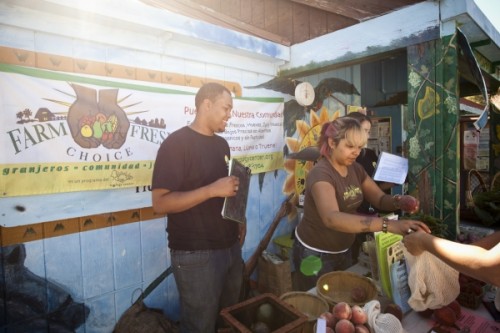This spotlight is a feature in a series of the USDA Community Food Project Competitive Grant Program (CFP) completed for WhyHunger’s digital storytelling website, Community Voices, that showcases grassroots organizations and community leaders through dynamic stories and pictures, to give a real view of projects that are working to alleviate food insecurity and increase communities’ access to nutritious food. We believe that telling one’s story is not only an act of reclaiming in the face of the dominant food narrative of this country, but also an affirmation that the small acts of food sovereignty happening across the country add up to a powerful, vital collective. Up today: The Ecology Center, Berkeley CA. Story and pictures by David Hanson.
“I started out just scrubbing walls,” says David McClellan, age 21. “Hours of scrubbing walls and painting classrooms.”
If there ever was a ladder to climb to get into urban agriculture, David started at the very bottom. He came to the Ecology Center as a court-ordered juvenile, required to work off eighty hours for getting caught doing something stupid. David didn’t know the first thing about gardening, farming, or healthy foods. He just needed to work off hours and HuNia, the Farm Fresh manager, had plenty for him to do.
But a funny thing happened during the three weeks it took for David to complete his hours. In addition to scrubbing the walls, he attended the events happening through the Ecology Center: food giveaways, healthy eating demonstrations, even a national conference where scientists talked about new innovative technologies. He liked what he was seeing and learning.
HuNia offered David an internship after he completed his community service. The Ecology Center had a program called Farm Fresh Choice that coordinates, markets, staffs, and stocks produce stands in Berkeley.
Yes, the same Berkeley, CA where organic food has been vogue for decades has pockets of food insecurity, neighborhoods and residents without access to fresh, affordable, healthy food.
“Berkeley has deep pockets of poverty and health dispairiteis,” says Martin Bourque, executive director of the Ecology Center. “Part of our CFP grant evaluation work included a 1999 health status report that correlated race and income with health outcomes. To see it on paper and understand that connection was fairly ground-shaking for the community. Large % of disparities were changeable and behavorial related.”
The Ecology Center, via Farm Fresh Choice conducted further surveys in the community to assess how to better infiltrate the specific need-based neighborhoods with healthy food stands. They found that location meant a lot. The stands needed to be in place of regular transit.
Read the full profile at Community Voices, a WhyHunger digital storytelling site showcasing voices of leaders and communities across the country on the front lines of food justice.



